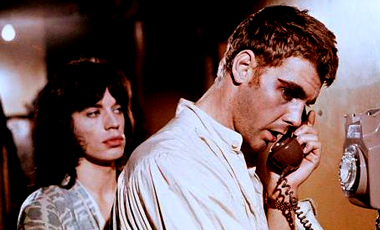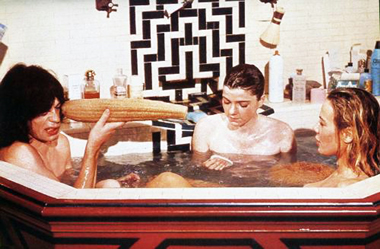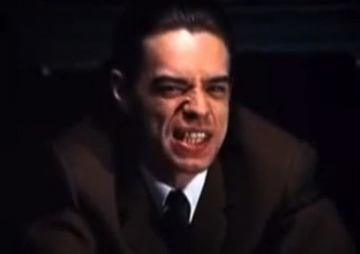
 |
|
|
|
The Warner Archive has been releasing Blu-ray classics for a while now, and their selection process has been sliding all over the map -- Fearless, The Wind and the Lion, The Women. The newest addition is the quality cult item Performance, a picture that seemingly wants to be seen in HD. By 1970 'the kids' were rejecting exploitation films about drugs, sex and rock 'n' roll. American-International's Haight-Ashbury epic Psych-Out (1968) had seemed bogus even when new, and many of the big-studio attempts to repeat the success of Easy Rider were total duds: Getting Straight, Zachariah. Even Michaelangelo Antonini's art film Zabriskie Point seemed to pander to the youth market: " How you get there, depends on where you're at!" Warner Bros. must have had high hopes for Performance, the dramatic film debut of Rolling Stones' superstar Mick Jagger. They screened the first cut of Donald Cammell and Nicolas Roeg's violent, symbolic art film and decided it was too incoherent to release. Many months and one major re-cut later, the film received a brief release and then became a permanent resident in repertory theaters. A sophisticated visual and aural knockout, the show begins as a gangster tale and morphs into an investigation of the meaning of identity, complete with references to the literary puzzle master Luis Borges. 
Co-director Donald Cammel's screenplay makes a connection between organized crime and the radical Rock lifestyle. London thug Chas (James Fox) terrorizes people for hoodlum Harry Flowers (Johnny Shannon) until Harry finds it advantageous to shift his business to one of Chas's old enemies. Barely managing to escape with his life, Chas holes up in a rented room belonging to Turner (Mick Jagger), a reclusive rock star. Suddenly seeming an ultra-square, Chas pretends to be a juggler, a deception that fools nobody, especially not Turner's long-time girlfriend Pherber (Anita Pallenberg). Turner, Pherber and their other playmate Lucy (Michèle Breton) decide to find out what makes their new friend tick by feeding him magic mushrooms. Chas asks for a passport photo, initiating a game of identities that eventually blurs the boundaries between Chas and Turner. We can only guess at what Warner Bros. executives expected when they bankrolled a hip film project featuring Mick Jagger -- something like A Hard Day's Night, perhaps? It's no surprise that Performance was put on hold indefinitely. Even though the new rating code had changed what could be shown on a screen, content this strong wouldn't be seen until 1971's crop of explicit sex and violence: Straw Dogs, The Devils, A Clockwork Orange. Performance's violence is ugly and its sex scenes steamy. Yet the dialogue is not vulgar -- I'm not sure we ever hear a curse word. Donald Cammell's screenplay begins as a brutal gangster picture, with hoods on the South side of London using force to take over businesses: "We prefer the word merge". James Fox's well-dressed extortionist Chas thinks nothing of intimidating a prominent lawyer, the perfectly cast Allan Cuthbertson. One extremely effective scene shows Chas ruining the lawyer's expensive Rolls-Royce by dousing it with acid. He then ties the lawyer's chauffer to the front bumper and shaves his head. 
Once hidden in the house of Jagger's drugged-out Turner, Chas is forced to play a psychedelic variation on the personality games of Joseph Losey's The Servant. Turner is a restless rock 'n' roll idol finished with performing. He does, however, carry on an endless orgy of sex and drugs with his two girlfriends. A tiny kid from the neighborhood, Turner's biggest fan, does odd jobs for them. That rundown doesn't begin to describe what the movie's really like. The mind games between Turner and Chas go far beyond mirror images and The Secret Sharer identity exchanges; the men are like unstable molecules, ready to exchange properties. When the immaculately dressed Chas intimidated his victims, he called himself a 'performer'. Bona fide performer Turner sees through Chas's deceptions but appears to respect his arrogant stance. Turner is well aware that his creative motivation, his Demon, has left him. Perhaps Chas can help bring it back. Meanwhile, we're invited along to witness a post-Mod happening scene of the kind that only rock stars experience. Turner, his old lady Pherber and their (probably underage) visa-challenged French playmate frolic in various combinations for a good part of the film's running time. Scenes in Turner's oversized bed and giant tub are more convincing than those seen in bohemian exposés like Quiet Days in Clichy. Pherber injects herself with what she claims is Vitamin B-12. She invades Chas' bed with the challenge to investigate his feminine side -- something fairly revolutionary for a 1968 film. She also takes apart Chas' automatic pistol ... much in the same way that she and Turner use psychedelic mushrooms to dismantle Chas's brain. 
Co-directors Cammell and Roeg invigorate the picture via inventive direction, excellent staging and luminous camerawork. There are few 'trippy' camera angles; the most conventional art-film setups involve mirrors and Persona- like dissolves between Chas and Turner as they begin to morph into a composite identity. Roeg knows how to make an image beautiful without interrupting the flow of the film -- one of the sex scenes (which could very well be the real thing) benefits from a rosy look duplicating light filtered through a blanket. Many '60s movies about drug trips are now embarrassments, even Roger Corman's original The Trip. Performance is dead-on accurate to things I witnessed at college. When Chas trips out over the multicolored inlays of Turner's coffee table, he stares and examines it as if examining an angel fallen from heaven. The gangster's verbal response reveals his basic materialistic alignment: "This is beautiful. I want to buy this." We're told that Performance originally resolved with more gangster action and a drug deal. The film as finished dives straight into the brains of the two leading characters and really never comes up for air. James Fox is excellent as the chilling gang enforcer. In one of his few starring roles, Mick Jagger does well adopting various attitudes and poses. When Turner calmly frolics with his girlfriends, we can believe that Jagger's been doing much the same for years. He reportedly based his characterization on one of his fellow Stones band members. Anita Pallenberg (Barbarella) has the look of a beauty slightly hardened by the drug life; she reportedly contributed to the screenplay. Chas' gangster associates are a chilling assortment of cutthroats led by Johnny Shannon's thuggish Harry Flowers, a bespectacled and gay 'business entrepreneur.' 
Jagger sings a couple of songs in a natural mode. To show Chas a bit of his performing style he prances about his recording studio, dancing with a neon tube. The film's classic line comes when Chas watches Turner dance: "You'll be a funny geezer when you're 50." Now 71, Jagger has been a lot of things, but 'geezer' isn't one of them. The movie's many themes reach their peak in a bravura musical number, Memo from T. It's basically an early '80s, MTV- style music video. Turner assumes a new identity that combines facets of both Chas and Harry Flowers. With his hair slicked back, Turner assumes Chas' threatening stance and belts out the lyrics while chairing a meeting of sexually subservient mobsters. It's both funny and scary. The Warner Archive Collection Blu-ray of Performance follows up on their DVD release from seven years ago. The film was originally tagged with an "X" rating but I'm told that what is shown here is a bit longer than standard American release prints. The HD encoding is very good and the film elements look in fine shape. The higher resolution helps us absorb the film's frequent blizzard of flash cuts. Attentive fans on the web have noticed that in some early scenes some of the gangsters' voices have been replaced with new replacement performances, presumably to make the dialogue more clear. I wouldn't notice, but this has irked people who remember exactly how lines like, "You're Jack the Lad!" sound. 1 Cameraman & co-director Nicolas Roeg has some interesting visual gimmick at work at all times. The film switches to grainy 16mm to represent Pherber's 8mm bedroom movies, and many shots seem to be imitating the visuals of modern art. Composer Jack Nitzsche uses one of the first Moog synthesizers to create disturbing music/sound effects. A grating electronic chime noise undercuts a speech in court. 
The good documentary Influence and Controversy appears to have been produced in HD. It gathers the film's producer, Ms. Pallenberg and others to delineate this film's strange path to the screen. Uncredited editor Frank Mazzola explains that everyone but Donald Cammell left the project when Warners took it over, and he spent months in the cutting room re-inventing a first cut judged overlong and unwieldy. Reorganized with new fractured montages, the film came down in length and picked up energy. The first shot up is an unrelated angle on a rocket-jet, to introduce a staccato montage sequence of Chas enjoying a wild sex party in the back of a moving limousine. The disc also contains an original trailer, and an original release featurette with some great material of Jagger and Cammell on the set, put together by promo people trying to fit Performance into a commercial mold. Any promo for a movie with Mick Jagger, that thinks it must verbally identify the superstar rock musician, can only be classified as hopeless.
On a scale of Excellent, Good, Fair, and Poor,
Performance Blu-ray rates:
Footnote: 1. A welcome clarification note from correspondent Willard Carroll, August 9, 2014: Hi, Glenn: As always, great fun to read your reviews - really, I think, the best overall approach to analyzing these new releases. There's way too much obsessing over tech issues! A couple of things - only because I'm obsessed with this stuff. Performance is one of my favorite films and I'm definitely a geek when it comes to that title. When the DVD was released I alerted Gary Tooze to the fact that is was a few seconds longer than any previous release, and that it was the first time in the U.S. that all the original production sound was used. For the initial U.S. release Johnny Shannon (gangster Harry Flowers) and Laraine Wickens (Lorraine) had both been dubbed to take the edge off their accents. The irony here is that actor Johnny Shannon got the part of Harry Flowers because he had originally been hired to coach James Fox on a Cockney accent! The DVD release was also, of course, noteworthy for eliminating -- by mistake, obviously -- a line of Jagger's dialogue during "Memo From Turner." This was fixed for the Blu-ray, which is also the same extended cut as the DVD. Anyway, in the new Blu-ray Lorraine's voice is production sound but Harry Flowers is dubbed throughout the entire film -- in a variant dubbing I'd never heard before! Johnny Shannon does the dubbing but, for me, it completely wrecks the performance (so to speak). The movie is, I think, both the best film about the Soho gangsters of the era and the counter-culture Zeitgiest. I did a movie in the UK about fifteen years ago and one of the camera department guys knew I loved the movie. He invited me to dinner at this phenomenal club called Gasworks in Chelsea and said there would be a "surprise." It turned out he was good friends with Johnny Shannon and we had a delirious cheap-wine-fueled night.
Anyway, you can file this under: Too Much Information. All the best, -- Willard Carroll

Reviews on the Savant main site have additional credits information and are often updated and annotated with reader input and graphics. T'was Ever Thus.
Review Staff | About DVD Talk | Newsletter Subscribe | Join DVD Talk Forum |
| ||||||||||||||||||